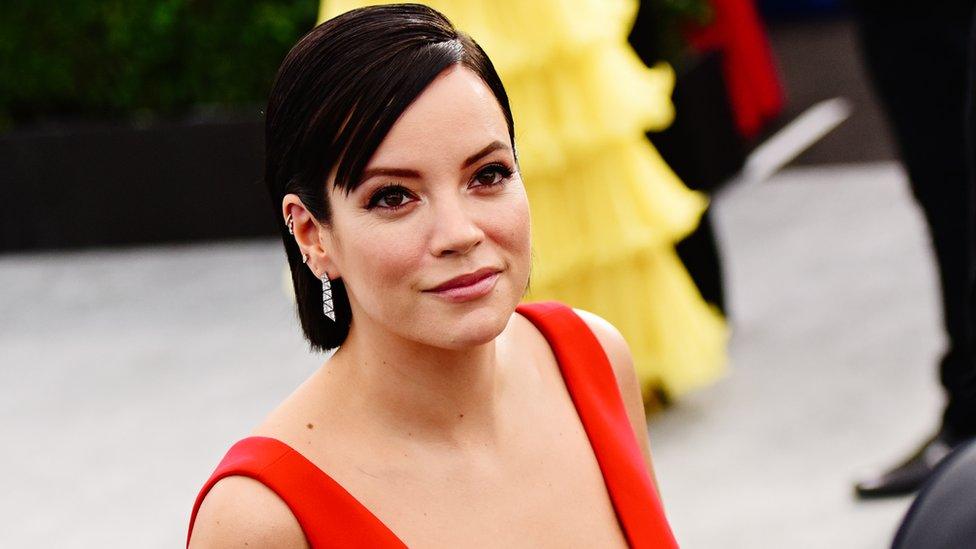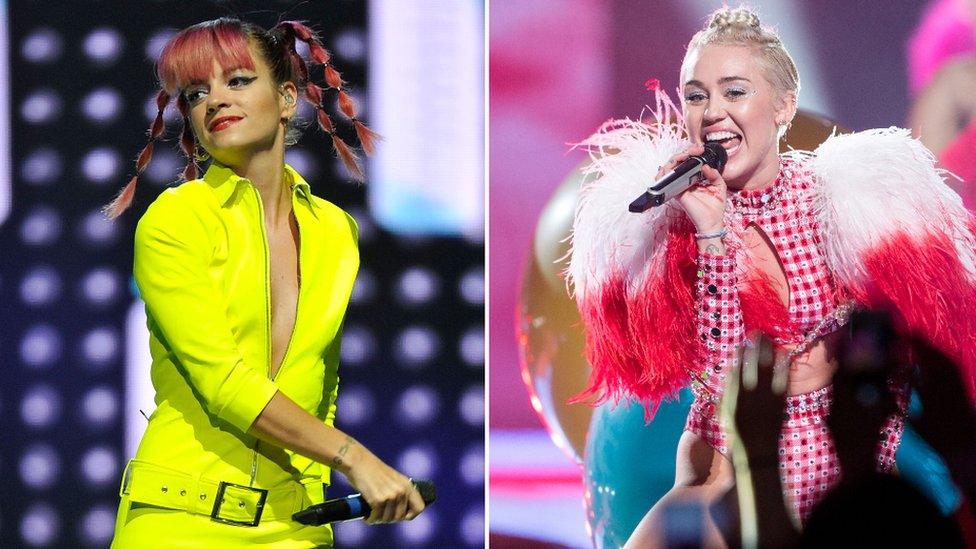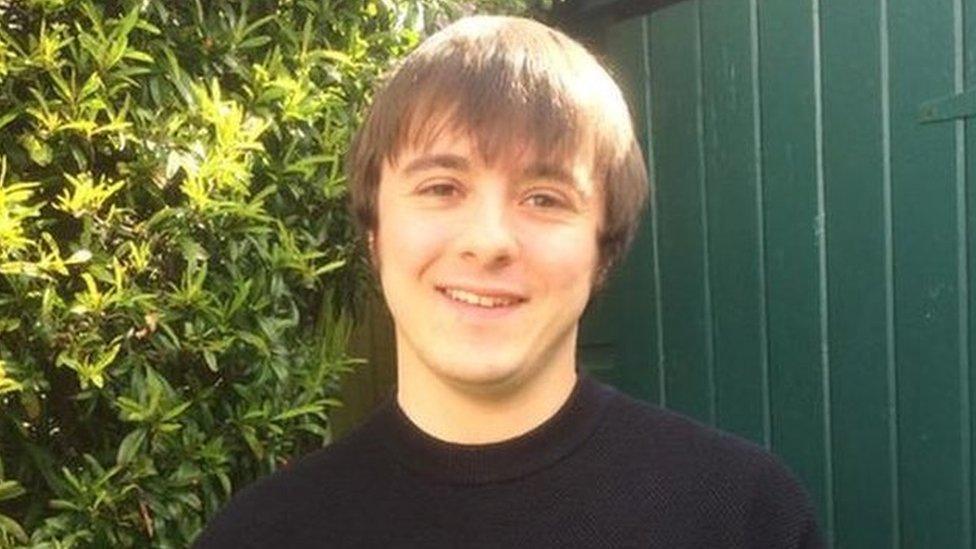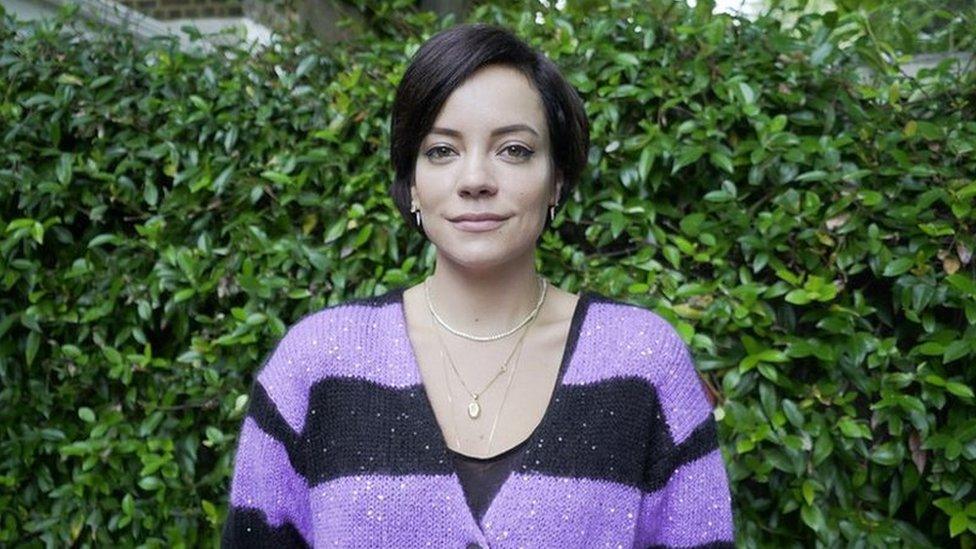Lily Allen opens up about addiction to Adderall for weight loss
- Published

The singer has previously discussed addiction in her 2018 memoir
Lily Allen has given more detail about how she became addicted to the prescription drug Adderall in 2014.
In a new interview, the 35-year-old said she had taken the drug in an effort to lose weight before supporting Miley Cyrus on tour.
"I was like 14 stone and just did not feel like a pop star at all," she told DJ Fat Tony on The Recovery podcast, external.
"So I started taking this drug called Adderall, which is like speed, to lose the weight.
"And I got addicted to this drug because it made me invincible and I could work really long hours and be all the people I was required to be."
It is not the first time Allen has discussed taking the drug, which is a prescription-only stimulant typically used to treat attention deficit hyperactivity disorder (ADHD).
In her 2018 memoir My Thoughts Exactly, the singer wrote: "I flirted with Adderall (which is really just a type of speed) as a way of getting or staying thin."
'Acting out'
In the new interview, Allen recalled supporting Cyrus on her Bangerz tour, a job she took to help bolster her finances.
She had given birth twice in the three years prior to the tour. Six months after her youngest child was born, Allen says she and then husband Sam Cooper had "run out of money and I had to go out on the road again".
Allen, who was promoting Sheezus, her first album in six years, was conscious of her appearance ahead of the tour.
"It was when [Cyrus] was doing Wrecking Ball and the Bangerz tour and it was a highly sexualised tour. I had just spent the last three years pushing babies out. It couldn't have been less what I felt like," Allen said.
"I had never supported anyone so I was re-entering this phase of being a pop star again but not doing it on my terms any more. I was supporting this girl who was much younger and more attractive than I felt, and I just started acting out in all manner of ways."

Lily Allen and Miley Cyrus, both pictured on the 2014 Bangerz tour
She continued: "I started cheating on my husband and I had always really drunk alcohol to take the edge off of the drugs, and then I realised I was getting up in the morning and downing those mini bottles of vodka or whisky or whatever was left, without the drugs any more."
She later considered taking heroin but stopped herself after "seeing what happens to people" who used the Class A drug. She decided instead to begin recovery.
Allen has previously discussed her relationship with drugs openly and has written her experiences into her music.
Her 2009 song Everyone's At It explores the widespread use of drugs in society, and includes the lyrics: "How can we start to tackle the problem / If you don't put our hands up / And admit that you're on them?"
What is Adderall?
Adderall is a stimulant which is only available by prescription in the US.
It is prescribed to treat ADHD, a neurobehavioral condition, external which is characterised by hyperactivity, trouble concentrating and impulsivity.
Its use has increased in the last two decades as Adderall has been prescribed to more school-age children, along with another stimulant, Ritalin, which has similar effects.
However, if taken by a person who does not suffer from ADHD, the effect is an increase in energy levels, concentration and performance. This has caused it become more popular among adults.
A 2004 episode of Desperate Housewives featured a storyline in which an exhausted Lynette Scavo (Felicity Huffman) started taking Ritalin prescribed to her son, to help her cope with the demands of motherhood.
A Netflix documentary released in 2018, Take Your Pills, explored the drug's popularity among groups such as students, who use it to improve grades.
Decreased appetite and weight loss are possible side effects of Adderall use, and it can also cause anxiety, insomnia and tremors.
Ritalin and Adderall can be addictive and both have a high potential for abuse. There is a long-term risk of psychological and physical dependence for users who feel they cannot fully function without it.

Follow us on Facebook, external or on Twitter @BBCNewsEnts, external. If you have a story suggestion email entertainment.news@bbc.co.uk, external.
Related topics
- Published5 April 2020

- Published13 September 2019

- Published8 June 2018

- Published3 April 2011